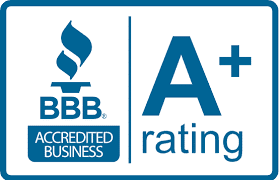Boiler vs Heat Pump: What’s Best for Vancouver’s Climate
Table of Contents
Boiler vs Heat Pump: Choosing the Right Heating System for Vancouver’s Climate
By BCRC Heating and Cooling – Your Trusted Local HVAC Experts
When the damp chill of a Vancouver winter sets in, the right heating system makes all the difference in keeping your home warm, efficient, and cost-effective. Two of the most popular options for homeowners are boilers and heat pumps. But which is the better choice for our West Coast climate?
At BCRC Heating and Cooling, we’ve helped countless Vancouver households—especially seniors—navigate the decision of Boiler vs Heat Pump. This guide will break down the differences, advantages, and considerations so you can make an informed choice that fits your comfort and budget. please check our professional heat pump installation Vancouver service if you need.
Understanding the Basics – Boiler vs Heat Pump
What is a Boiler?
A boiler heats water, which is then circulated through radiators, baseboard heaters, or in-floor heating systems to provide warmth. Boilers can be powered by natural gas, propane, oil, or electricity.
Pros of Boilers:
Comfortable radiant heat
No air movement (better for allergies)
Reliable in cold weather
Can also provide domestic hot water
Cons of Boilers:
Higher energy costs for older models
No cooling capability
Slower to change temperatures
What is a Heat Pump?
A heat pump transfers heat from the outside air (or ground) into your home in winter, and reverses the process to provide cooling in summer. Air-source heat pumps are most common in Vancouver due to our moderate climate.
Pros of Heat Pumps:
Heats and cools in one system
Very energy-efficient
Lower operating costs
Environmentally friendly
Cons of Heat Pumps:
Efficiency drops in extreme cold (less of an issue in Vancouver)
May require backup heating in some cases
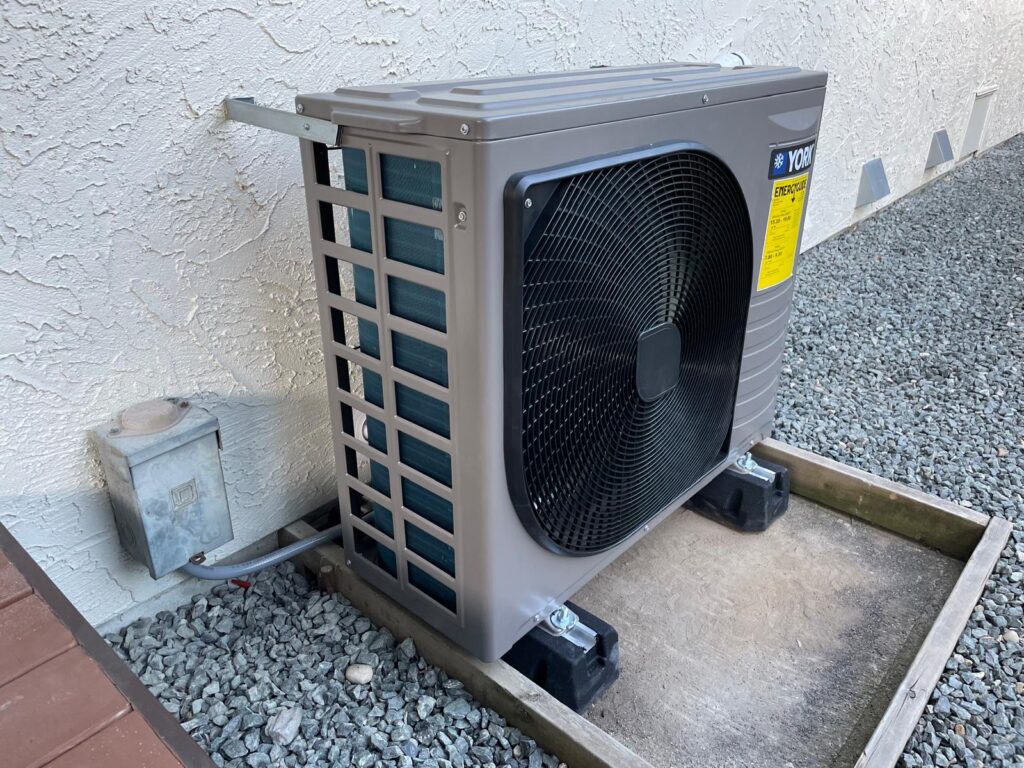
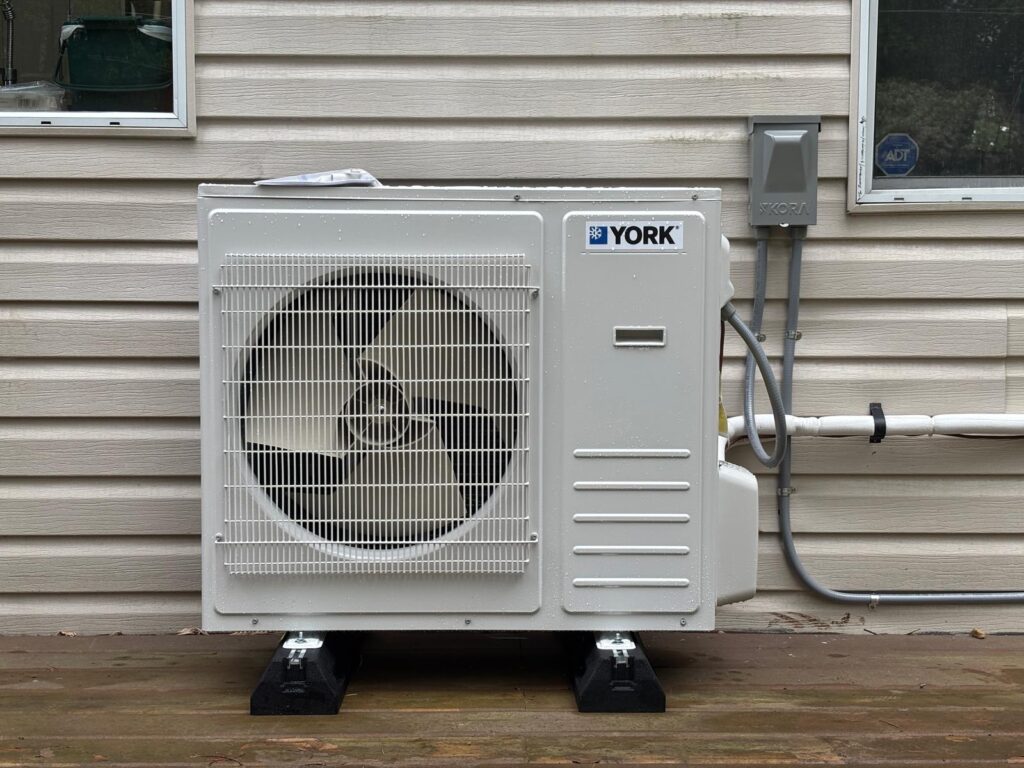
Boiler vs Heat Pump – Side-by-Side Comparison
| Feature | Boiler | Heat Pump |
|---|---|---|
| Heating Method | Radiant heat via water | Transfers heat from air or ground |
| Cooling | No | Yes |
| Energy Efficiency | Medium to high (modern condensing boilers are efficient) | Very high (up to 300–400% efficiency) |
| Operating Cost | Higher if older model | Lower |
| Installation Cost | Medium to high | Medium to high |
| Best For | Homes with existing hydronic systems | Homes needing both heating & cooling |
| Comfort Type | Steady, even warmth | Adjustable, all-season comfort |
Energy Efficiency in Vancouver’s Mild Climate
One of Vancouver’s greatest advantages is its temperate winter temperatures, which typically hover between 0°C and 8°C. Unlike colder Canadian cities such as Edmonton or Winnipeg — where heat pumps often struggle to operate efficiently without substantial backup heating — Vancouver’s mild winters allow heat pumps to run at peak performance nearly year-round.
Heat Pumps in Vancouver
In the Boiler vs Heat Pump debate, efficiency is often a deciding factor. Because heat pumps work by transferring heat rather than generating it, they can be incredibly efficient, delivering up to three units of heat for every unit of electricity consumed (a Coefficient of Performance, or COP, of 3 or higher).
In Vancouver, these systems rarely have to work against extreme temperature differentials, meaning less strain, lower running costs, and longer system lifespan. Many newer models also come with variable-speed compressors that adjust output to match demand, improving efficiency further.
Boilers in Vancouver
While Vancouver’s climate suits heat pumps well, boilers remain a strong contender in the Boiler vs Heat Pump comparison — particularly in homes with existing hydronic systems.
A modern condensing boiler can reach up to 95% efficiency, recovering heat from exhaust gases that older boilers would simply vent outdoors. This technology can significantly lower energy bills when replacing an aging, less efficient model.
In short, when it comes to pure operational efficiency, a well-chosen heat pump has the edge in Vancouver’s climate. But in homes where a hydronic system is already in place, upgrading to a condensing boiler can be the most cost-effective move in the Boiler vs Heat Pump decision-making process.
Comfort and Air Quality: Radiant Warmth vs. Moving Air
When comparing Boiler vs Heat Pump options, it’s not just about numbers — it’s about how the heating feels. Comfort is a major factor for many homeowners, and each system delivers it differently.
Boilers — Radiant Heat for Consistent Warmth
Boilers provide radiant heat through radiators, baseboards, or in-floor heating systems. Radiant heat warms objects, floors, and people directly, creating an even, cozy warmth throughout the home without the drafts often associated with forced-air systems.
Because no air is being blown around, dust, pollen, and allergens aren’t circulated — making boilers a favorite among seniors and those with respiratory sensitivities. Hydronic radiant floor heating, in particular, is prized for its luxurious comfort, especially in bathrooms and living areas.
Heat Pumps — Air Circulation with Air Quality Benefits
In the Boiler vs Heat Pump comfort comparison, heat pumps offer a different approach. They rely on moving air through ductwork or indoor wall units, which can be beneficial when combined with high-quality filtration to remove dust, allergens, and even airborne pathogens.
The ability to provide both heating and cooling from the same system is a major plus, especially as Vancouver experiences more frequent summer heatwaves. Temperature changes are faster with a heat pump, so homeowners can adjust comfort levels more quickly than with radiant systems.
Ultimately, if you value quiet, steady, draft-free heat, a boiler will be hard to beat. If year-round temperature control and improved indoor air quality are priorities, a heat pump has the advantage — and knowing your comfort priorities will guide you in the Boiler vs Heat Pump decision.
Installation Considerations
Switching from one heating system to another can be a major project — or a relatively straightforward upgrade — depending on your current setup. The Boiler vs Heat Pump installation process differs in cost, complexity, and space requirements.
Boiler Installation
Best suited for homes that already have radiators or underfloor hydronic piping, boiler installation can be straightforward when replacing an old unit with a modern condensing boiler. For homes without existing hydronic systems, installation costs can be significantly higher due to the need for new piping and radiators or in-floor heating loops.
Heat Pump Installation
Heat pump installation is often the preferred route in the Boiler vs Heat Pump comparison for homes that require both heating and cooling, or those undergoing renovations. Heat pumps can be installed as ducted systems, making use of existing forced-air ducts, or as ductless mini-split systems, ideal for homes without ductwork.
For ductless setups, installation involves placing one or more indoor units on walls or ceilings, connected to an outdoor compressor. In older Vancouver homes with limited space, ductless heat pumps can avoid the cost and complexity of adding ductwork — a factor that often tips the scale in the Boiler vs Heat Pump choice.
At BCRC Heating and Cooling, we start every project with a complete home assessment — considering square footage, insulation, existing systems, available space, and long-term energy goals. This ensures that whether you choose a boiler or a heat pump, your system will be efficient, cost-effective, and perfectly suited to your home.
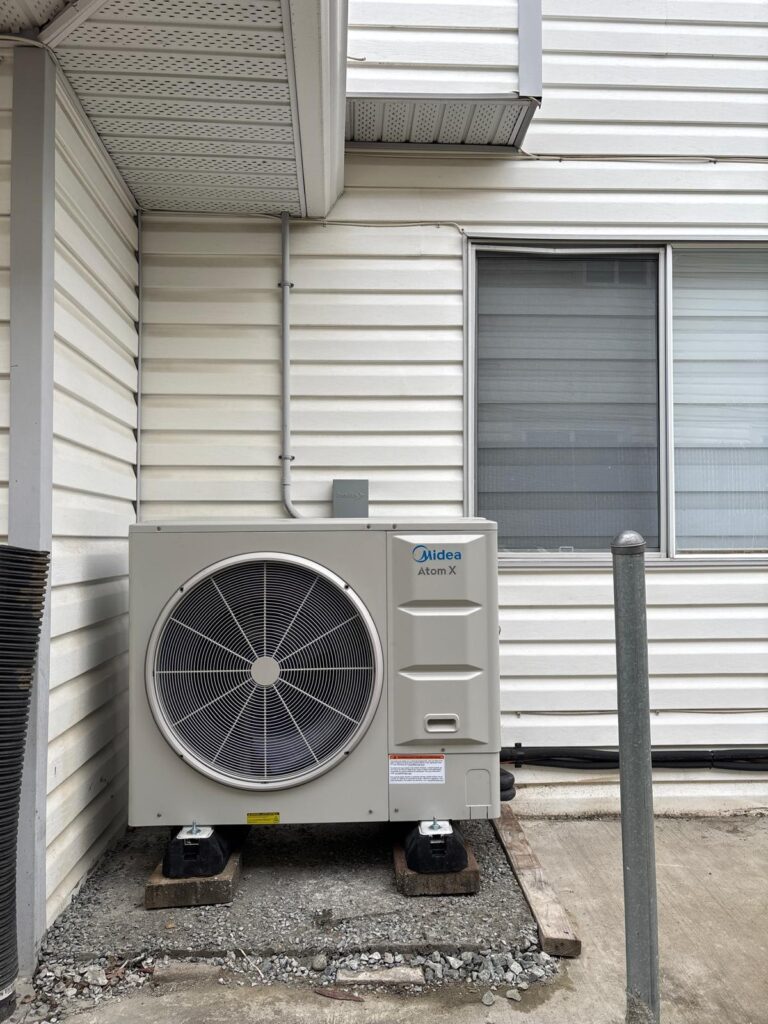
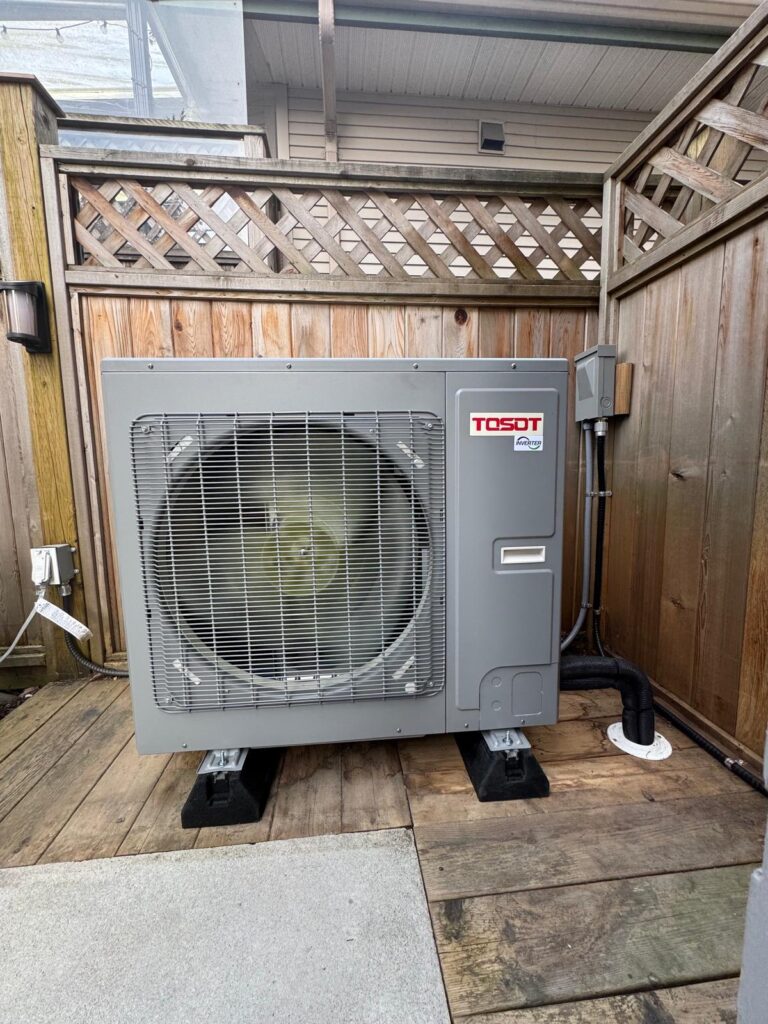
Emergency Expert Heat Pump Service Vancouver
Maintenance Requirements and Lifespan
Proper maintenance is critical to keeping both boilers and heat pumps operating efficiently and safely.
Boiler Maintenance:
Annual servicing is essential to check for leaks, ensure safe combustion, and maintain efficiency.
This includes inspecting the heat exchanger, venting system, and safety controls, as well as flushing the system if needed to remove scale or sediment.
A well-maintained boiler can last 15–20 years, and hydronic piping can last decades longer.
Heat Pump Maintenance:
Requires seasonal maintenance, including cleaning or replacing air filters, checking refrigerant levels, inspecting coils, and ensuring drainage systems are clear.
Because heat pumps run year-round (for both heating and cooling), they can experience more wear and tear than a boiler that operates only during the heating season.
With proper care, most heat pumps last around 15 years, though some premium models can reach 20 years in Vancouver’s mild climate.
Environmental Impact: Carbon Footprint and Sustainability
When it comes to eco-friendliness, the Boiler vs Heat Pump discussion takes on another dimension.
Heat Pumps and Low-Carbon Heating:
Because they move heat rather than generate it, heat pumps produce significantly less greenhouse gas emissions — especially when powered by BC Hydro’s renewable electricity grid.
This makes them one of the most sustainable heating options available, with the potential to drastically reduce a home’s carbon footprint.
Boilers and Modern Efficiency Gains:
Older boilers, especially those running on oil, can be significant carbon emitters.
Modern condensing boilers, however, are far cleaner and more efficient, especially when paired with renewable energy sources such as solar thermal systems.
In situations where a hydronic system is already installed, upgrading to a high-efficiency boiler can still deliver substantial carbon savings without the cost and disruption of switching to a heat pump.
Which Is Better for Seniors?
When we advise seniors on Boiler vs Heat Pump, we consider:
Ease of use – Boilers often have a simple control panel, while heat pumps feature programmable thermostats.
Noise level – Boilers are typically very quiet indoors; modern heat pumps are also quiet but have an outdoor fan.
Year-round comfort – Heat pumps provide both heating and cooling, which can be helpful for seniors sensitive to summer heat.
Boiler vs Heat Pump – Our Recommendation
Choose a Boiler if: You have an existing hydronic heating system, love radiant comfort, and don’t need cooling.
Choose a Heat Pump if: You want both heating and cooling, prioritize energy efficiency, and want to take advantage of rebates.
For many Vancouver homes, a hybrid solution—a heat pump paired with a boiler—offers the best of both worlds.
Frequently Asked Questions
Q: Can a heat pump replace a boiler in my home?
Yes, but it may require changes to your distribution system unless you install a high-temperature hydronic heat pump.
Q: Will a boiler keep working during a power outage?
Only if it’s a gas boiler with a standing pilot light or connected to a backup power source.
Q: Are heat pumps noisy?
Modern models are very quiet, especially compared to older AC units.
Your Comfort, Your Choice
When deciding Boiler vs Heat Pump, consider your home’s current infrastructure, your comfort preferences, and your long-term energy goals. Both systems have advantages, but the right choice depends on your unique needs.
Let’s Find Your Perfect Heating Solution
Stay comfortable year-round with the right system for your home. Contact BCRC Heating and Cooling today for your free in-home consultation on Boiler vs Heat Pump solutions in Vancouver. Call (604) 781-7272 or visit bcrcheating.com to schedule your appointment.

